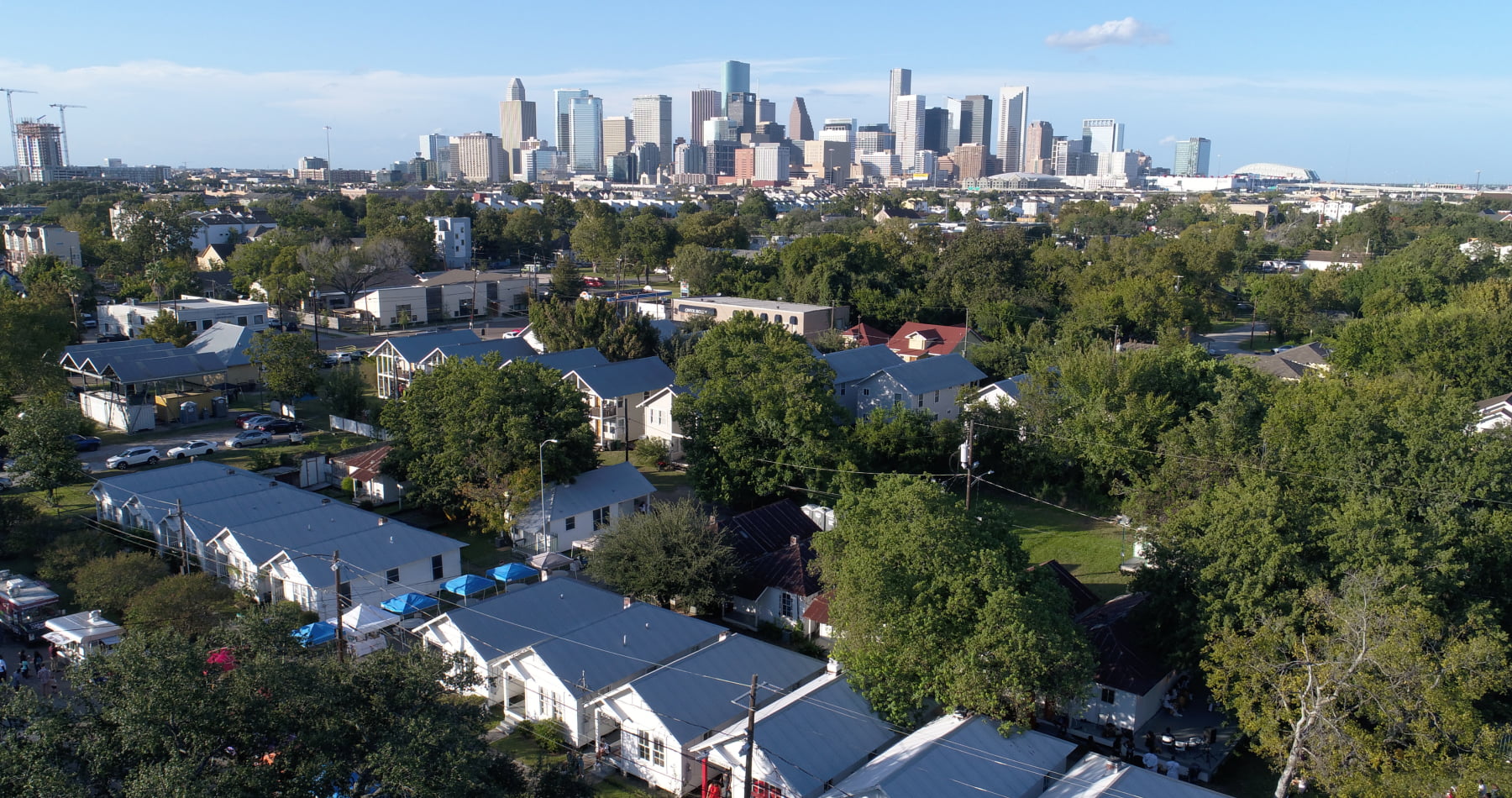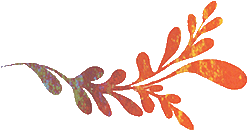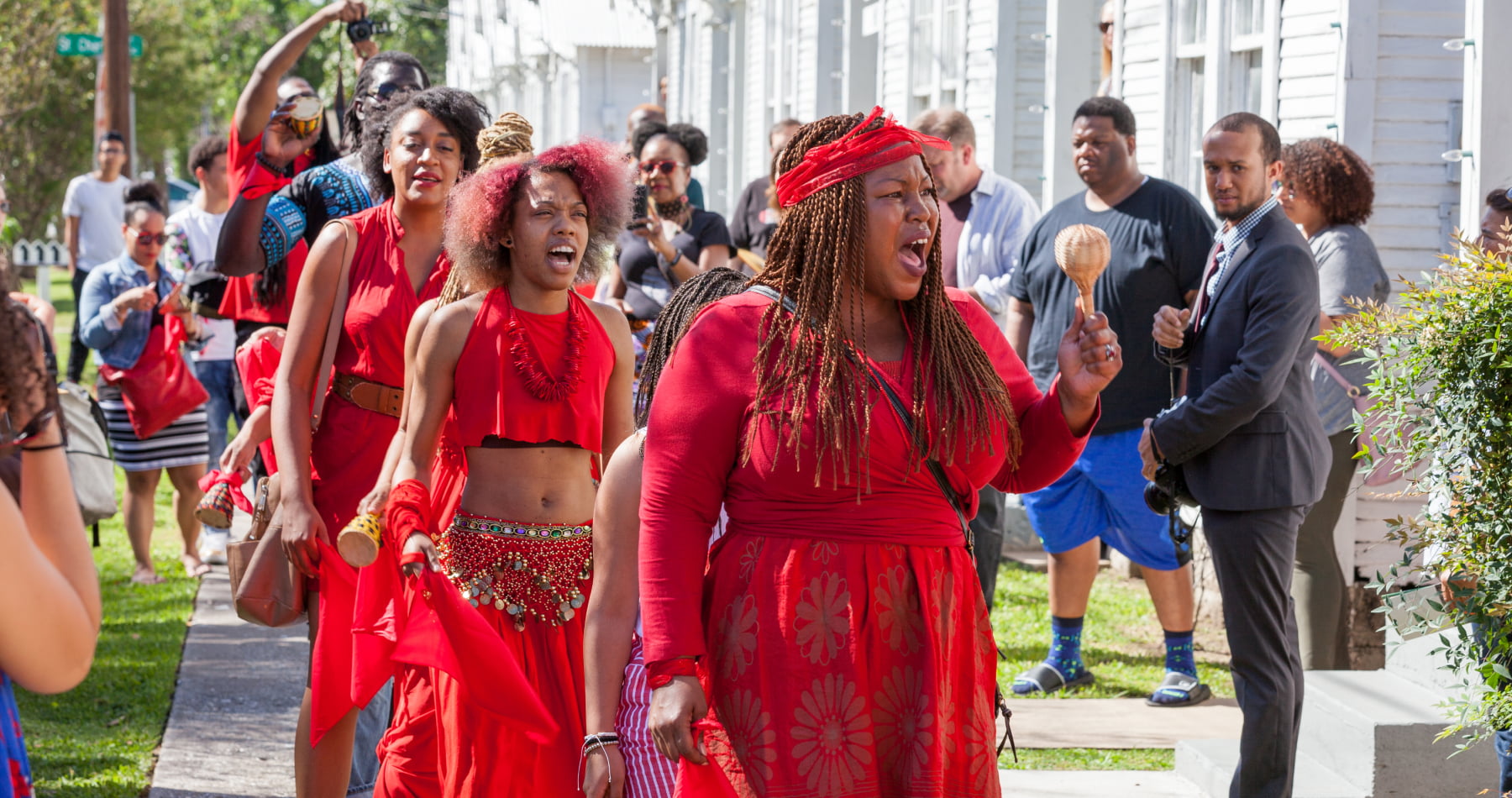Arts & Culture
Place-BASED Equity
When art creates community
By Emily Nonko
Eureka Gilkey describes returning to her hometown of Houston, Texas to take on the role of executive director at Project Row Houses as a “nontraditional path.”
Gilkey had spent 20 years in Washington, D.C., holding senior leadership positions for Obama for America 2008, Emily’s List, NARAL and the Department of Housing and Urban Development under the Obama Administration.
The 27-year-old community-based organization is credited with revitalizing Houston’s Third Ward historic Black neighborhood by using art as a catalyst to address cultural, educational and social issues.
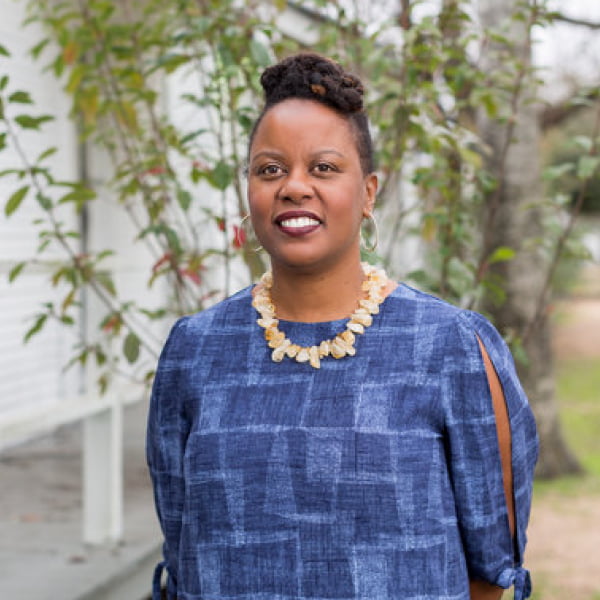
Eureka Gilkey serves as executive director of Project Row Houses
Project Row Houses hired Gilkey in 2015. That was less than a year after one of the organization’s founders, Rick Lowe, was awarded a MacArthur "genius grant.” Lowe, along with six other artists, was responsible for transforming 1 1/2 blocks of derelict shotgun houses in the Third Ward into community and cultural spaces some 20 years earlier. Gilkey joined the team after the organization had expanded to offer resources to artists, small businesses and local residents, including transitional housing for young mothers.
Gilkey spent her early years with the organization strengthening its infrastructure, particularly after Hurricane Harvey hit in 2017. Today, she says, “we have a lot of responsibility in defining socially engaged art and codifying that in a way people can see it’s a model, not just some buzzword." The organization took up that task as part of an ambitious collaboration with industry leaders across the country in late 2019.
Equity-Focused Community Development
Project Row Houses is one of 11 arts and community development organizations that have received grant funding from the BASED (Building and Supporting Equitable Development) initiative. The three-year, $8 million pilot effort launched by The Kresge Foundation’s Arts & Culture Program provides a platform for continued learning of both leading practitioners and Kresge staff around emerging field priorities, such as strengthening racial equity and inclusion best practices within the community development sector.
“We recognize that the unique contribution of a cultural approach is that it brings so much creativity and does a better job of capturing resident priorities.”— Seth Beattie, Kresge Foundation
“We’ve seen really extraordinary work in bringing forward arts and culture practices to create more equitable approaches to all the core components of community development,” says Seth Beattie, a senior program officer with Kresge’s Arts & Culture Program, who oversees the BASED initiative.
The goal of BASED, Beattie says, is to bring organizations doing such distinct work into a collaborative, national learning community to develop a shared agenda for equitable Creative Placemaking. Organizations that merge arts and culture with racially equitable approaches to economic development, housing and community services are part of the collective. “We recognize that the unique contribution of a cultural approach is that it brings so much creativity and does a better job of capturing resident priorities,” Beattie says.
Asian Economic Development Association (AEDA) is also a BASED grantee that works to expand economic opportunities for Asian Americans with low incomes in Minneapolis-Saint Paul. AEDA has launched Creative Placemaking efforts, such as the Little Mekong business and cultural district, where arts and cultural initiatives have supported relationship-building among St. Paul’s Frogtown residents and merchants.
“By expanding the BASED initiative, the Arts & Culture team is working to strengthen the pipeline of Creative Placemaking practitioners in American cities and invest in creative approaches that empower residents to drive change and restore wellness in their neighborhoods.”— Regina Smith, Managing Director Kresge Foundation
Another BASED grantee, the People’s Emergency Center (PEC), provides affordable housing and other resources to residents of West Philadelphia to creatively strengthen neighborhoods and drive change. PEC, for instance, partnered with Philadelphia's 16th Police District and a network of local arts organizations to host a year-long series of outdoor workshops, public performances and design-build events meant to foster dialogue about public safety and cultural identity.
Transferring Knowledge and Empowering Communities
At Project Row Houses, the arts, culture and Creative Placemaking practices embedded in the organization’s DNA have evolved to address the needs of Houston’s Third Ward.
“Since 2015, we’ve led anti-gentrification efforts in the neighborhood,” Gilkey says.
That work prompted a partnership with Local Initiatives Support Corporation (LISC) to launch a financial opportunity center with arts at its core. LISC's financial opportunity centers, which operate off a successful model to help low-income people reach their financial goals, have been supported by Kresge's Arts & Culture and Human Services programs.
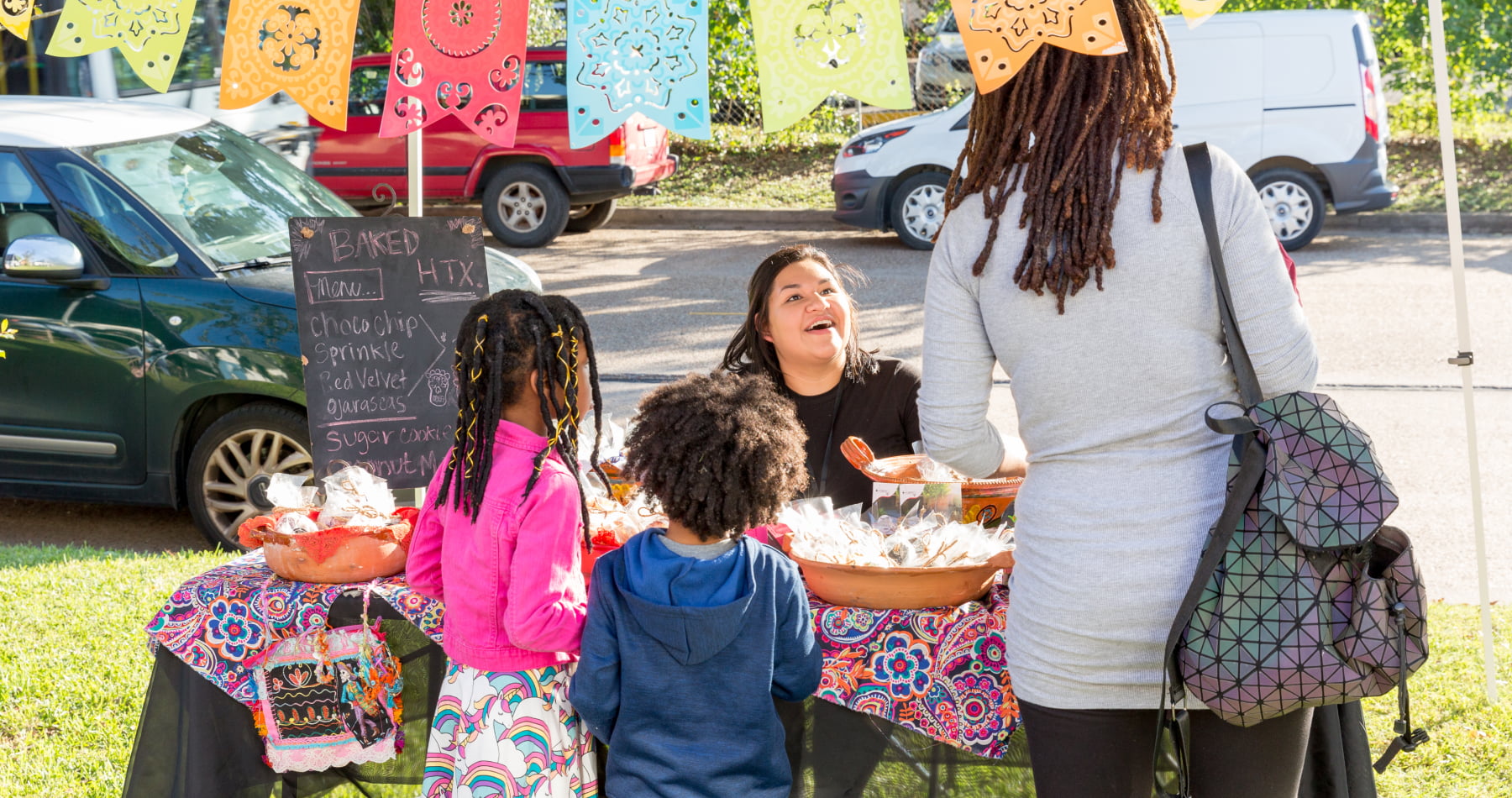
Local entrepreneurs participate in a community market
“We’d be the first arts and culture organization in the city of Houston to take this partnership with LISC and expand it,” Gilkey adds.
As part of BASED, Gilkey works with Michelle D. Johnson, a senior program officer with Kresge’s Arts & Culture Program.
“This organization took its rich creative and cultural practices and applied them to the real-life challenges facing residents — lack of access to housing, open space and social service supports — and invested in residents’ own ideas for more equitable and inclusive approaches,” Johnson says.
“We’d be the first arts and culture organization in the city of Houston to take this partnership with LISC and expand it."— Eureka Gilkey, Executive Director at Project Row Houses
Gilkey’s expertise will be shared with other community development peers who are participating in BASED. In July 2020, Kresge invited six additional organizations to join the BASED cohort.
“By expanding the BASED initiative, the Arts & Culture team is working to strengthen the pipeline of Creative Placemaking practitioners in American cities and invest in creative approaches that empower residents to drive change and restore wellness in their neighborhoods,” said Regina Smith, managing director. “Each grantee partner showcases strong models of integrating arts and cultural programming as tools to engage residents’ voices and priorities to shape equitable community development.”
Freelance writer Emily Nonko is based in Brooklyn, New York.
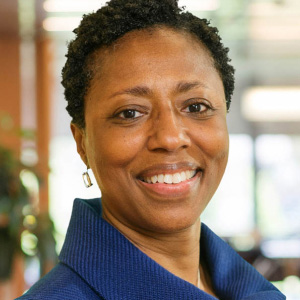
Strengthening the Equitable Creative Placemaking Field

Regina R. Smith, Managing Director
Arts and culture remain vitally important during our country’s most turbulent times.
Just as we are witnessing with the COVID-19 pandemic, people with low incomes and communities of color are impacted first and most negatively in moments of crisis.
Yet, even outside of crises, we must acknowledge the historic trauma and systemic racial injustices experienced by people with low incomes, the disinvestment in the places where they live and the normalized acts of exclusion.
As inequality grows and isolationism sets in, we need creative solutions to support the overall well-being of people’s lives — building social cohesion, engaging communities, bridging differences and tackling issues of inequality. The Creative Placemaking field contributes to long-term change by providing new avenues for arts, culture and community-engaged design to serve as central elements of community development and planning. Since first launching our Creative Placemaking strategy in 2012, we have been thinking critically about how Kresge might best influence national field-building and support the next generation of Creative Placemaking leaders to ensure more equitable outcomes.
Therefore, in 2019 our strategy evolved to focus on strengthening the equitable Creative Placemaking field, increasing creative capacity to shape healthier neighborhoods and catalyzing creative change in cities. Through this approach, we have elevated the field’s influence on equitable outcomes by placing greater emphasis on activities that help undo underlying inequities and result in, among other outcomes, stronger social cohesion, increases in resident-driven action and positive narrative change.
To achieve this, we focused our funding on cohorts where we see the greatest promise for work specific to the Creative Placemaking field, including the launch of:
- BASED (Building and Supporting Equitable Development): This pilot initiative provides a platform for community and arts-based organizations to share their racial equity and inclusion best practices in community development.
- Culture of Justice: In collaboration with our Human Services Program and our Boys and Men of Color internal working group, this national initiative is supporting five organizations in cities that are using arts and culture to reimagine justice in their cities.
- FreshLo (Fresh, Local & Equitable): This joint effort with our Health Program provides funds for neighborhood-scale projects that integrate healthy food, Creative Placemaking, community development and equity into their work.
Already, these initiatives are achieving outcomes centered on arts, culture and community-engaged design that are contributing to more equitable places, more just systems and more resilient people with choices to lead self-determined, healthy lives.
